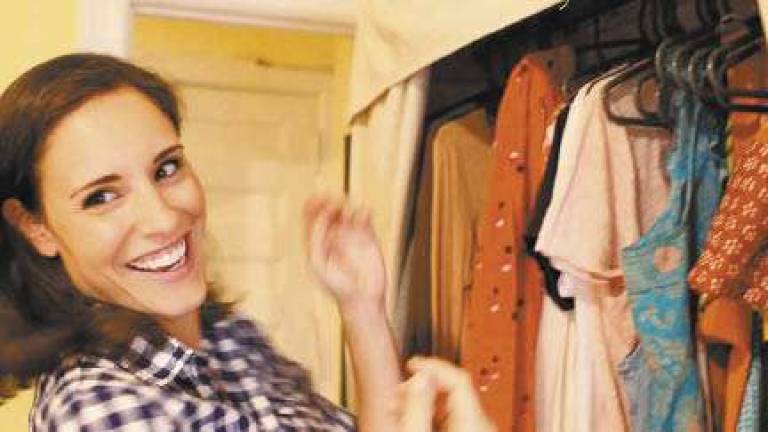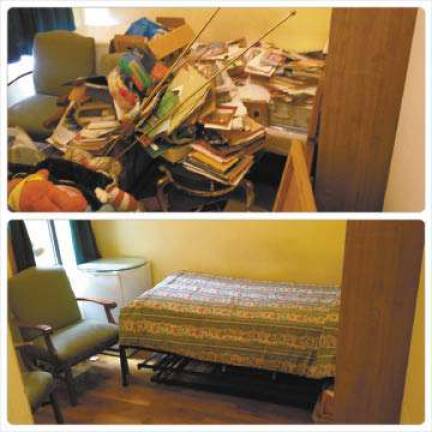Bringing the Brilliance Back to Living in The Big Apple


Upper East Sider Amelia Meena started Appleshine to help with the daunting task of organizing our belongings
When you're trying to stuff that last pair of jeans into an overflowing drawer, don't you ever want to stop and just declutter? That's where personal organizer Amelia Meena comes to the rescue as your own cheerleader, teacher, motivator, therapist, and interior designer all rolled into one. The 32-year-old started Appleshine to help New Yorkers with the daunting task of organizing, decluttering, and, ultimately, loving their homes no matter how large or tiny they are. When she's not rearranging kitchens, she's bringing donations to family shelters, or putting shoe racks over the doors of studios. As a child in Kentucky, she would always eagerly volunteer to organize her friends' rooms. "Now, here I am living in New York City. I get to do that every day with these tiny apartments," she said.
What does someone's apartment say about them?
We tend to judge people based on their space, saying, "You must not have your stuff together if you literally don't have your stuff together." Everybody has a right to express themselves at home how they'd like to, but my clients come to me when they realize their home is not expressive in the way they'd like it to be. There's an interesting book called Snoop, by Dr. Sam Gosling. Through his research, he discovered that everyone assumes you're a nicer person if your space is more organized. Whether it's right or not, that's not the point. The point is society really tells us how to judge people based on their space.
You said your dad always told you to live within your means. How do you apply that to apartment living in New York City?
He taught us to live within our means mostly financially, however I took that to a broader scale. Think about what you have and how your life's going to fit into that. A lot of times I bring up the point of capacity limits with my clients. For instance, I had a client who was recovering pens from all across her apartment. She kept finding pens. And she would have a huge wad of them and she's like, "They all work. I don't want to throw them away." I said, "You probably have so many pens because you never designated a home for pens so you could not find them when you need them, then you have to buy more." So if you can designate a home, that place becomes a capacity max. So say that it's now a drawer in your kitchen. Those are where the pens live. But ultimately, if you go over capacity, then you have to scale back.
I'm sure you've been overwhelmed at times. What have been the most daunting places you've had to organize?
I do my best work with people who want to work with Appleshine. The most daunting projects have been with people who aren't ready to get organized. Someone put them up to it, or are in a circumstance, like a time crunch, or dealing with the loss of a loved one. They're emotionally not ready, and it's hard.
How do you help clients who are dealing with the loss of a loved one?
A client's mother had passed and she had a lot of her artwork. She was able to donate to a company called Art Start, which teaches art classes to homeless children in the city. It was very specific to her mother's legacy.
Through your experience, what have you learned about why we hold onto things?
I find that we hold onto them for a lot of emotional reasons. Memorabilia we'll hold onto because our memory is attached to a physical item. We'll hang onto it because of guilt - someone gave it to us or it reminds us of someone. And we don't want to disrespect them by getting rid of it. A lot of people keep things for financial reasoning. They paid a lot of money for it at one point. And I use the counterpoint. This is an item you agreed to purchase at a price for its service and that service has likely expired. Even though it's still a good item, those jeans no longer fit you or that shirt is no longer in style.
I have so many books. How do you deal with those?
Books are tough because they're another one of those very sentimental things. I'm a very tangible person; I love holding a book and turning the page. However, we just don't need them in our lives extensively because they take up precious space. The New York Public Library has a decent return policy in some of their facilities. Children's books are pretty easy to give back. There are great organizations that help gain books for correctional facilities. It helps promote literacy, empowerment, and education.
How can one incorporate sentimental items into everyday living?
I have a breadbox that I got from my grandfather. I'm sure it has no monetary value, the veneer is chipping, but it's something I remember from going to his home as a young girl. I have it on display and I use it. That makes me really happy. I have some clients who have their grandparents' stuff and they just keep it boxed up. What if it was part of your home décor or it's in good enough shape that you can actually use it? A lot of what I do involves coming in and asking clients the hard questions. It's not me being judgmental as much as it's offering a counterpoint and making them think about their decisions.
After you declutter, where's the best place to donate in Manhattan?
My favorite place to donate is to a family shelter. You can do research and find one in your neighborhood. Because they house men, women, and children, they have a need for a large variety of products. They'll take clothing, toys, electronics, household goods. It's a one-stop shop and you know the goods you give are getting used immediately. Sure, you can take things to Housing Works or Goodwill, but they have a processing procedure and it might take a little longer. I've never encountered a family shelter yet that said "no," but I always call ahead.
Since it's almost Valentine's Day, let's talk about the interview you did about the concept of dating your apartment.
Yeah, we did that [interview] last year with Apartment Therapy. It was about accepting your space for what it is. Just like we always tell our girlfriends, "Just accept him for who he is and don't try to change him." The same goes with your space, especially in New York City. We are very limited with space, it's not going to change, so we have to accept it and work with it instead of against it. Even aesthetically, if it has quirks or design flaws, how can you make them work for you? If you only have one closet and you're visual and inspired by your clothes, put them on display in your room on an open rack and use the closet for things that are less attractive, like paperwork.
To learn more about Appleshine, visit www.appleshinenyc.com
Follow Amelia on Twitter: @appleshinenyc